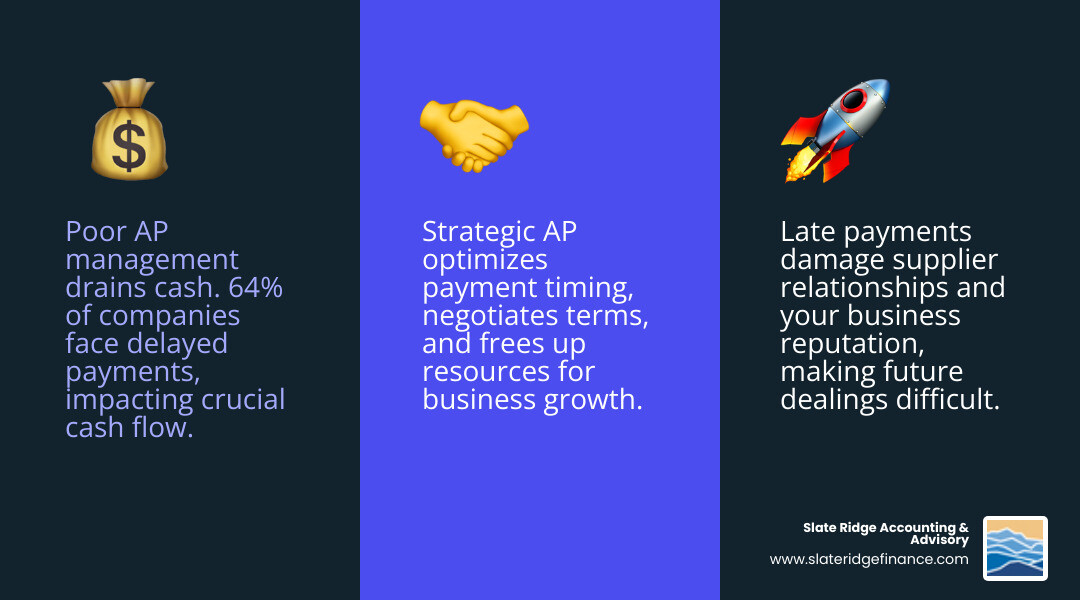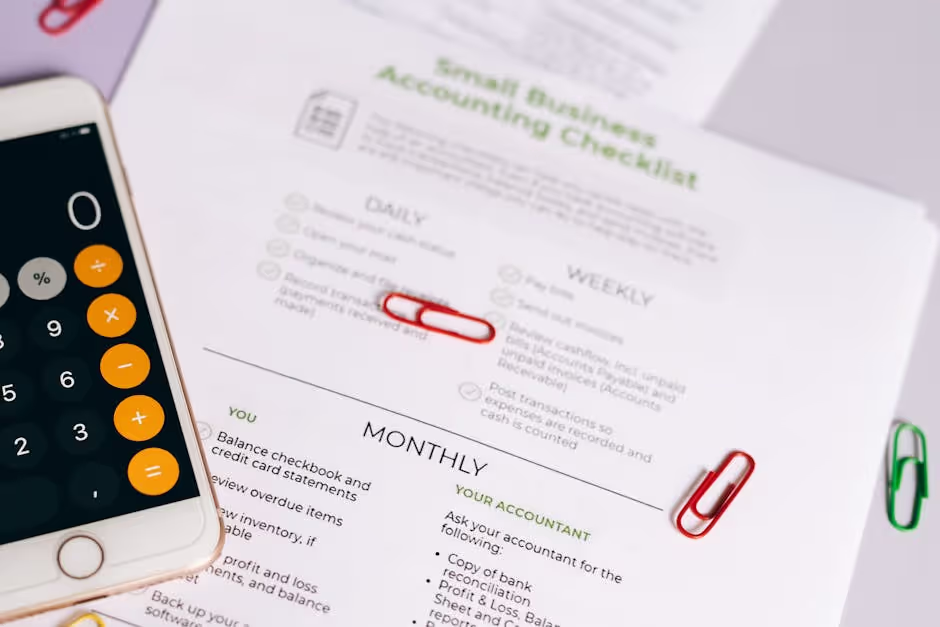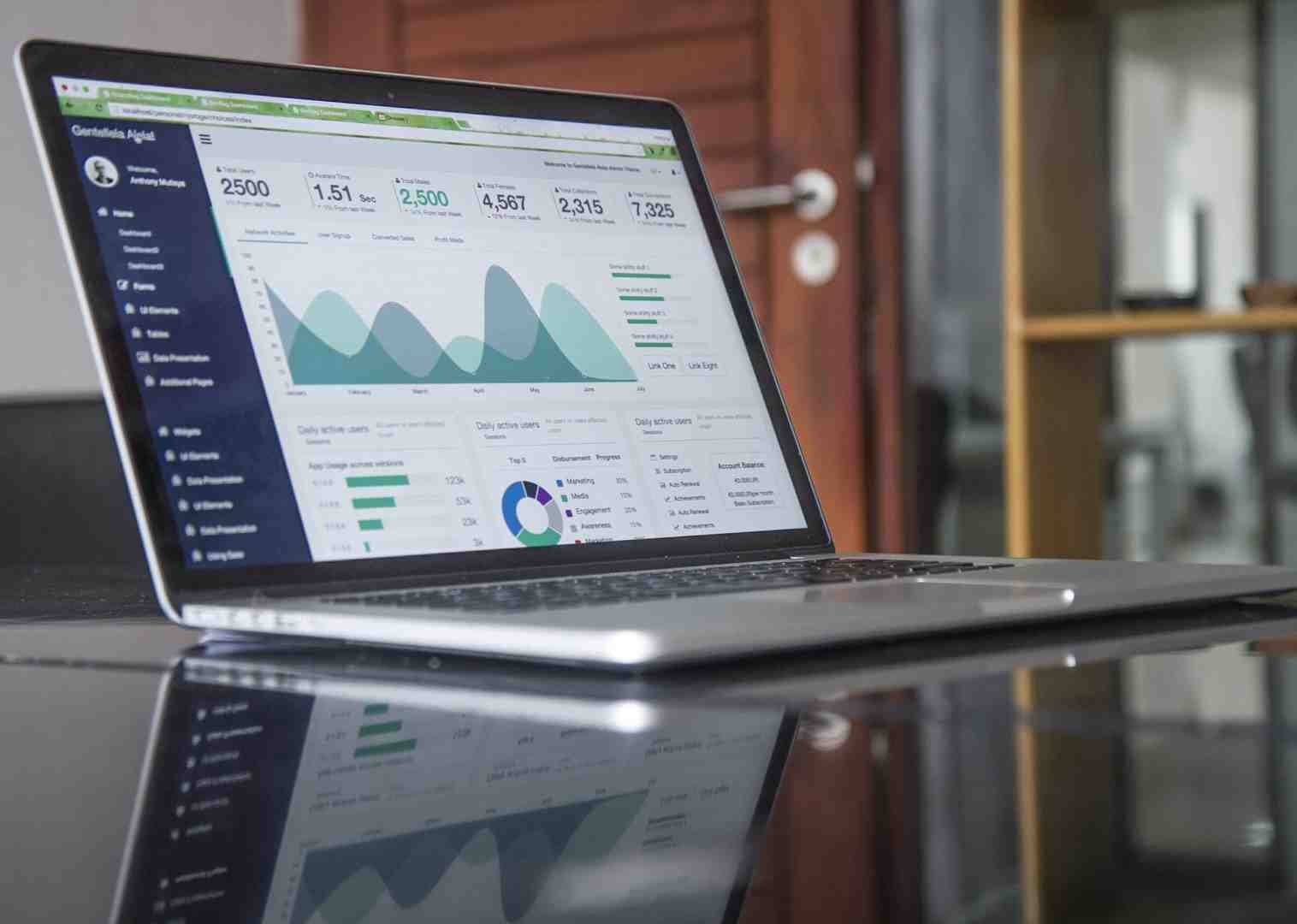Why Mastering Accounts Payable is a Game-Changer for Your Business
Accounts payable tips for small business owners can transform one of your biggest administrative headaches into a strategic advantage. If you're drowning in unpaid invoices, missing payment deadlines, or struggling to maintain good relationships with suppliers, you're not alone.
Quick Reference: Essential Accounts Payable Tips
- Establish a clear AP process - Invoice receipt → Three-way matching → Approval → Payment → Record keeping
- Centralize your data - Use accounting software to organize all vendor information and invoices
- Build strong supplier relationships - Pay on time, communicate openly, negotiate better terms
- Strategic purchasing - Consolidate vendors, negotiate bulk discounts, align purchases with cash flow
- Optimize payment timing - Use AP aging reports to prioritize payments and maximize cash flow
- Leverage automation - Electronic payments, invoice scanning, automated approvals
- Prevent fraud - Segregate duties, verify vendor changes, use secure payment methods
- Track performance - Monitor KPIs like Days Payable Outstanding and cost per invoice
Accounts payable (AP) represents the money your business owes to suppliers for goods and services you've received but haven't paid for yet. It's the flip side of accounts receivable - while AR is money coming to you, AP is money going out.
Here's why getting your AP right matters more than you might think:
Cash flow is everything. Poor AP management can drain your bank account faster than a leaky bucket. Research shows that 64% of companies face delayed payments, with suppliers typically waiting 43 days to get paid. When you can't manage your outgoing payments strategically, you lose control of your cash flow.
Your reputation depends on it. Late payments don't just cost you money in fees - they damage relationships with the suppliers who keep your business running. As one expert puts it: "Mismanaging your company's money and responsibilities is a surefire way to lose your reputation and lose money."
It's a competitive advantage. Smart AP management isn't just about paying bills - it's about optimizing when you pay them, negotiating better terms, and using technology to free up your time for growing your business.

Foundational Accounts Payable Tips for Small Business Success
Getting your accounts payable foundation right is like building a house - skip the basics, and everything else becomes shaky. These core accounts payable tips for small business owners will create the solid groundwork you need for financial stability and growth.
1. Establish a Clear and Consistent AP Process
Scrambling at month-end to figure out which invoices are due, paid, or even legitimate? A clear AP process eliminates this chaos.
Invoice receipt is your starting point. Every bill that comes through your door (or inbox) needs immediate attention. Don't let them pile up on your desk like autumn leaves - capture and record them right away.
Next is three-way matching. It's simply checking that three documents tell the same story: the purchase order, receiving report, and invoice. When they match, you know the invoice is legit. This single step prevents most billing errors and catches fraud before it hits your bank account. For a deeper dive into this crucial process, check out What Is Three-Way Matching & Why Is It Important?.
Approval workflows ensure no payment sneaks out without proper authorization. For small businesses, this might be as simple as the owner giving final approval. As you grow, you can set different approval levels based on invoice amounts.
Payment scheduling means no more surprise due dates. Once approved, record when each bill is due and when you plan to pay it. This prevents late fees and helps you manage cash flow strategically.
Finally, record keeping creates your audit trail. Document who paid what, when, and why. Future you (and your accountant) will thank you when tax season rolls around or when a supplier questions a payment.
2. Centralize Data and Maintain Meticulous Records
Remember spending twenty minutes hunting for an invoice in a pile? Centralizing your data eliminates those frustrating treasure hunts.
Your chart of accounts acts as the filing system for your entire business. It categorizes every expense consistently, so you always know where your money is going. Set it up right from the start, and it'll serve you for years.
Vendor information needs a permanent home too. Keep each supplier's contact details, payment terms, and banking information in one easily accessible place. This prevents duplicate entries and ensures payments reach the right destination every time.
Going digital with your records isn't just trendy - it's practical. Scan those paper invoices and store electronic ones in a cloud-based system. Suddenly, you can find any invoice from anywhere, anytime. No more digging through filing cabinets or panicking when you're working from home.
Attaching source documents directly to your accounting entries creates an instant connection between the transaction and its proof. When you record a payment, attach the original invoice right there in your software. This makes audits and reconciliations surprisingly painless.
Centralized software brings everything together beautifully. Modern accounting platforms manage invoices, vendor details, and payments in one place, often with automated features that save you hours each week.

3. Nurture Strong Supplier Relationships
Here's a secret many business owners overlook: your suppliers can become your biggest allies. Strong relationships with vendors often translate into better pricing, flexible terms, and priority service when you need it most.
Timely payments form the foundation of every good supplier relationship. When you consistently pay on time, suppliers notice. They'll prioritize your orders, offer better service, and be more understanding when you occasionally need flexibility.
Open communication works wonders when problems arise. If you're facing a temporary cash flow crunch, call your supplier before the payment is late. A quick conversation explaining the situation often leads to extended terms rather than damaged relationships.
Negotiating payment terms isn't just for big corporations. Many suppliers offer Net 30 as standard, but they might extend to Net 45 or Net 60 for reliable customers. This extra time can significantly improve your cash flow without costing you anything.
Early payment discounts deserve serious consideration. Some suppliers offer small percentage discounts (like 2% off) if you pay within 10 days instead of 30. If your cash flow allows it, these discounts add up to substantial savings over time.
Building strong supplier relationships is smart business strategy for a more resilient and profitable operation. When you need expert help managing these crucial relationships, our outsourced accounting services can help you optimize every aspect of your accounts payable process.
Strategic AP Management for Improved Cash Flow and Growth
Once you've mastered the fundamentals, it's time to transform your accounts payable from a necessary chore into a powerful business tool. These advanced accounts payable tips for small business owners will help you squeeze every drop of value from your AP process while strengthening your cash position.
4. Strategic Purchasing: An Overlooked Accounts Payable Tip for Small Business Savings
Here's something many business owners miss: your AP strategy begins before you receive an invoice. Smart AP management starts with how you buy things in the first place.
Every purchasing decision you make today becomes tomorrow's accounts payable challenge (or opportunity). When you approach purchasing strategically, you're pre-optimizing your entire AP workflow.
Bulk discounts can dramatically reduce your per-unit costs if you have the storage space and cash flow to handle larger orders. We've seen clients cut their supply costs by 15-20% simply by buying three months' worth of inventory at once instead of ordering weekly. Just make sure you're not tying up too much cash in products that might expire or become obsolete.
Consolidating vendors is another game-changer that most small businesses overlook. Instead of buying office supplies from five different companies, what if you found one supplier who could handle 80% of your needs? You'll likely qualify for better pricing, more favorable payment terms, and you'll have fewer invoices to process each month. Plus, you become a more valuable customer to that vendor.
Negotiating long-term agreements works especially well for recurring expenses like software subscriptions, cleaning services, or raw materials. Many suppliers will offer significant discounts for annual contracts instead of month-to-month arrangements. One of our clients saved $3,000 annually just by switching their software subscriptions from monthly to yearly billing.
The real magic happens when you start aligning purchases with cash flow cycles. If you know you'll have a big influx of cash next month from a major project, that's the perfect time to make those larger purchases you've been putting off. This strategic timing prevents cash crunches and keeps your working capital healthy.
5. Optimize Payment Timing with AP Aging Reports
One of the most powerful accounts payable tips for small business success is learning to pay strategically, not just promptly. Your cash is a tool, and holding onto it longer (legally and ethically) gives you more flexibility and options.
An AP aging report becomes your roadmap for this strategy. This simple report shows all your unpaid invoices organized by how long they've been outstanding - current invoices, those 1-30 days old, 31-60 days old, and so on. It's like having a crystal ball that shows exactly what cash will need to go out your door and when.

Prioritizing payments becomes much clearer when you can see everything laid out this way. Those overdue invoices need immediate attention to avoid late fees and preserve supplier relationships. But for current invoices? That's where strategy comes in.
Maximizing payment terms means paying invoices on their due date, not before (unless there's a discount involved). If a supplier gives you Net 30 terms, use all 30 days. That's not being cheap - it's being smart with your cash flow. Every day you hold onto that money is another day it can earn interest, cover unexpected expenses, or fund growth opportunities.
We often see well-intentioned business owners avoiding early payments without discounts, essentially giving their suppliers free loans. While it feels good to clear invoices off your desk, paying a $5,000 invoice 20 days early with no discount is like lending that supplier $5,000 interest-free for three weeks. Your business can probably find better uses for that cash.
The key is finding the sweet spot where you maintain excellent supplier relationships while optimizing your cash position. Your AP aging report makes this balancing act much easier to manage.
6. Leverage Technology and Automation
If you're still drowning in paper invoices and manually typing vendor information into spreadsheets, you're working way harder than you need to. Modern technology can transform your accounts payable from a time-consuming headache into a smooth, almost hands-off process.
AP automation benefits go far beyond just saving time (though you'll save lots of that). Automation dramatically reduces errors, gives you real-time visibility into what you owe and when, and can actually improve your cash flow by eliminating the delays and mistakes that plague manual processes. We've watched clients cut their invoice processing time from hours to minutes while simultaneously reducing errors by over 90%.
Accounting software features have evolved tremendously in recent years. The best platforms now handle everything from invoice capture to payment processing in one integrated system. Look for software that can automatically import invoices from emails, match them to purchase orders, route them for approval, and even schedule payments based on your cash flow preferences.
Invoice scanning (OCR) technology feels almost magical when you first use it. You literally take a photo of a paper invoice with your phone, and the software automatically extracts all the key information - vendor name, amount, due date, line items - and creates the entry in your accounting system. No more squinting at receipts or typing invoice numbers by hand.
Automated approvals can speed up your entire process while maintaining proper controls. Set up rules so that invoices under $500 get automatically approved, while larger amounts get routed to the appropriate manager. Approvers can review and approve invoices from their phones during their commute or between meetings.
Electronic payments (ACH, credit cards) are safer, faster, and often cheaper than paper checks. ACH transfers typically cost under $1 each compared to $3-5 for paper checks when you factor in postage, check stock, and processing time. Plus, you can schedule them in advance and track them in real-time. Some platforms even let you pay vendors with credit cards (earning you rewards) even when the vendor doesn't normally accept cards.
The change from manual to automated accounts payable isn't just about efficiency - it's about freeing up your time and mental energy for the parts of your business that actually drive growth. If you're curious about how to implement these solutions without the usual headaches, our team can help guide you through the process. Check out more info about our pricing for accounting services to see how we make this transition smooth and painless.
Protecting Your Business: Security and Compliance in AP
Your accounts payable system handles thousands of dollars flowing out of your business every month. Without proper safeguards, you're essentially leaving your front door wide open with a sign that says "money inside." These security-focused accounts payable tips for small business aren't just nice-to-haves—they're essential armor for your financial health.
7. Fraud Prevention: A Critical Accounts Payable Tip for Small Business Security
Here's a sobering reality: fraud costs businesses around 5% of their revenue each year. For a small business earning $500,000 annually, that's $25,000 walking out the door. Small businesses are particularly attractive targets because fraudsters assume (often correctly) that we have fewer security measures in place.
The good news? Most AP fraud is preventable with some smart precautions.
Segregation of duties is your first line of defense, even if you're running a lean operation. The person who approves invoices shouldn't be the same person cutting checks. We know this can be challenging when you're wearing seventeen different hats, but even small separations help. Maybe you approve invoices, but your bookkeeper processes payments, or vice versa.
One of the sneakiest fraud tactics we see involves vendor banking changes. A fraudster emails you, impersonating a legitimate supplier, requesting that future payments go to a "new" bank account. Always verify these requests by calling your vendor directly using a phone number from previous correspondence—never use contact information from the change request itself.
Two-factor authentication might seem like overkill, but it's like having a deadbolt on your financial systems. Even if someone gets your password, they still can't access your accounts without that second verification step.
Here's something that might surprise you: paper checks are becoming a major security liability. According to a FinCEN alert on check fraud, check fraud cases nearly doubled from 350,000 in 2021 to 680,000 in 2022. Criminals are literally fishing checks out of mailboxes and washing them clean to rewrite for different amounts.
Electronic payments like ACH transfers aren't just more secure—they're also cheaper, costing around $0.26-$0.50 per transaction compared to $2-4 for checks. Your suppliers will appreciate faster payments, and you'll sleep better knowing your money isn't sitting in a mailbox somewhere.
8. Conduct Regular Audits and Track KPIs
Think of auditing your AP process like getting a regular health checkup. You might feel fine, but a closer look often reveals issues you didn't know existed. Regular internal audits help you catch errors before they become expensive problems and ensure your security measures are actually working.
Your internal controls are the policies and procedures that keep everything running smoothly and securely. These include things like approval limits (maybe anything over $1,000 needs your personal sign-off), regular reconciliations, and yes, that segregation of duties we talked about earlier.
But here's where many small business owners miss a golden opportunity: tracking Key Performance Indicators (KPIs). These numbers tell the story of how efficiently your AP process is running and where you can improve.
Days Payable Outstanding (DPO) measures how long you take to pay suppliers on average. A higher DPO (while still paying on time) means you're holding onto your cash longer, which improves cash flow. If your average payment terms are Net 30 but your DPO is only 15 days, you might be paying too early.
Cost per invoice reveals how much you're spending just to process each bill. If you're manually entering every invoice and writing paper checks, this number might shock you. Automation can often cut this cost by 60% or more.
On-time payment percentage reflects your reliability as a customer. Consistently hitting 95% or higher keeps suppliers happy and your business reputation intact. Anything below 90% suggests your process needs attention.
These aren't just numbers for the sake of having numbers—they're your roadmap to a more efficient, secure, and profitable AP process. When you know where you stand, you can make informed decisions about where to invest your time and money for the biggest impact.
Frequently Asked Questions about Accounts Payable
We hear the same questions from small business owners all the time when they're trying to get their finances organized. Let's tackle the big ones that keep coming up in our conversations with clients.
What's the difference between accounts payable and accounts receivable?
This trips up a lot of business owners, but once you get it, it's simple! Think of it this way: accounts payable (AP) is money flowing out of your business to suppliers and vendors for things you've already received but haven't paid for yet. It's essentially your business's IOUs.
Accounts receivable (AR), on the other hand, is money flowing into your business from customers who owe you for products or services you've delivered. When you look at your balance sheet, AP shows up under current liabilities (what you owe), while AR appears under current assets (what's owed to you).
Here's the cash flow reality: both AP and AR directly impact how much money you have available to run your business day-to-day. If your customers are slow to pay (high AR) while your suppliers want their money quickly (pressing AP), you're caught in a cash flow squeeze. That's why mastering these accounts payable tips for small business alongside your AR management is so crucial for keeping your business financially healthy.
What are the best payment methods for supplier payments?
We get this question constantly, and honestly, if you're still writing paper checks for everything, you're making your life harder than it needs to be!
Electronic payments, especially ACH transfers, are our top recommendation for most small businesses. These digital bank-to-bank transfers cost between $0.26 and $0.50 per transaction, compared to the $2-4 you're spending on each paper check. They're faster, more secure, and create an automatic digital trail that makes reconciliation so much easier.
Credit cards can be a smart choice too, especially if you're earning rewards or need the extra float time between when you make the purchase and when you pay the credit card bill. Some newer AP platforms even let you pay vendors by credit card even when the vendor only accepts ACH or checks - they handle the conversion for you.
As for paper checks, we strongly encourage our clients to phase them out whenever possible. The fraud risk alone should give you pause. FinCEN alert we mentioned earlier about the surge in check fraud? With 680,000 cases in 2022 compared to 350,000 the year before, checks are becoming a liability rather than a convenience.
The security, speed, and cost-effectiveness of electronic methods make them clear winners for implementing solid accounts payable tips for small business.
What features should I look for in accounts payable software?
Choosing the right software can feel overwhelming with all the options out there, but focus on what will actually make your life easier and your business more profitable.
Automation should be your number one priority. Look for software that can automatically capture invoice data from emails or scanned documents using OCR technology, route invoices through your approval workflow, and even schedule payments. The time you'll save on data entry alone will pay for the software.
Seamless integration with your existing accounting system is non-negotiable. Whether you're using QuickBooks, Xero, or another platform, your AP software should sync perfectly to avoid double-entry and keep your books accurate.
Robust reporting and analytics capabilities will transform how you manage cash flow. You want real-time AP aging reports, vendor spending analysis, and the ability to forecast upcoming payment obligations. This visibility helps you make smarter decisions about when to pay what.
Strong security features protect your business from fraud and data breaches. Look for encryption, user access controls, audit trails, and fraud detection. Given how much financial data flows through these systems, security isn't optional.
Flexible payment execution options let you pay vendors however works best - ACH, credit card, or wire transfers. Batch payment capabilities save time when you're paying multiple vendors at once.
The right software becomes a strategic tool that helps you implement all the accounts payable tips for small business we've discussed, turning your AP process from a necessary evil into a competitive advantage.
Conclusion: Transform Your AP from a Cost Center to a Strategic Asset
What started as a simple guide to paying bills has revealed something much more powerful: accounts payable tips for small business success aren't just about staying organized—they're about changing how your business operates and grows.
Think back to where we started. Maybe you picked up this article because invoices were piling up, suppliers were calling about late payments, or your cash flow felt like a roller coaster you couldn't control. Sound familiar?
Here's what we've finded together: accounts payable can be your secret weapon. When you establish clear processes, centralize your data, and build strong supplier relationships, you're not just avoiding problems—you're creating opportunities. Those early payment discounts start adding up. Suppliers begin offering you better terms. Your cash flow becomes predictable instead of chaotic.
The strategic elements we explored take this even further. Strategic purchasing decisions can slash your costs before you even receive an invoice. Smart payment timing using AP aging reports keeps more money in your account longer. Automation and technology free up hours of your time each week—time you can spend growing your business instead of drowning in paperwork.
But perhaps most importantly, the security and compliance practices we covered protect everything you've built. With fraud costing businesses around 5% of their revenue annually, these aren't nice-to-have features—they're essential shields for your financial future.
Your accounts payable system should work for you, not against you. It should give you better cash flow, stronger supplier relationships, and clearer financial insights. When done right, it becomes a strategic asset that supports your growth rather than a cost center that drains your resources.
At Slate Ridge Accounting & Advisory, we see this change happen all the time. Small business owners come to us feeling overwhelmed by their financial processes, and we help them build systems that actually support their goals. Our cloud-based virtual accounting services are designed specifically for businesses like yours—modern, personalized solutions that help you track the KPIs that matter and forecast the growth you're working toward.
The best part? You don't have to figure this out alone. Whether you need help setting up these processes, choosing the right software, or just want someone to review your current system, we're here to guide you through every step.
Ready to turn your accounts payable into a competitive advantage? Get expert help with our virtual accounting services and start building the financial foundation your business deserves.

Ready to get started?
Book a free consultation today and let’s explore how Slate Ridge can support your business with expert accounting that’s accurate, timely, and built around your goals.






